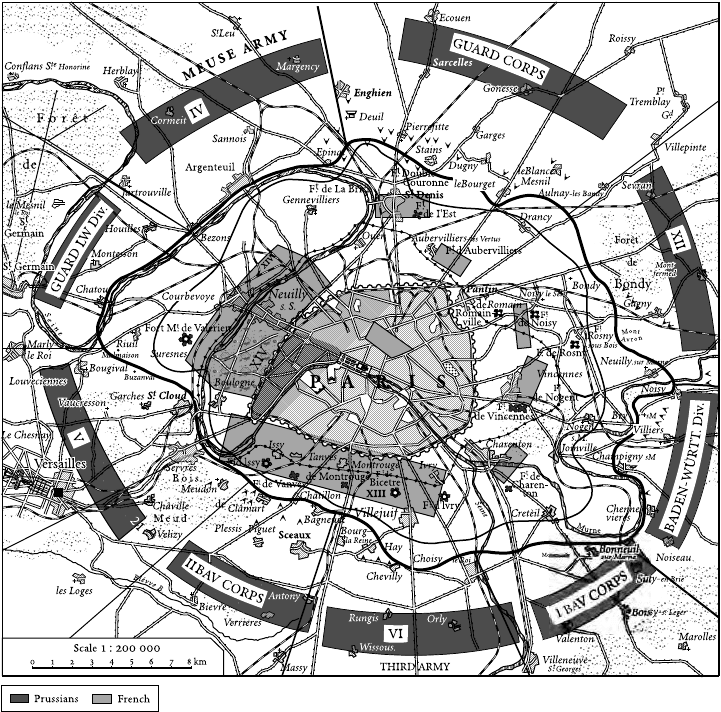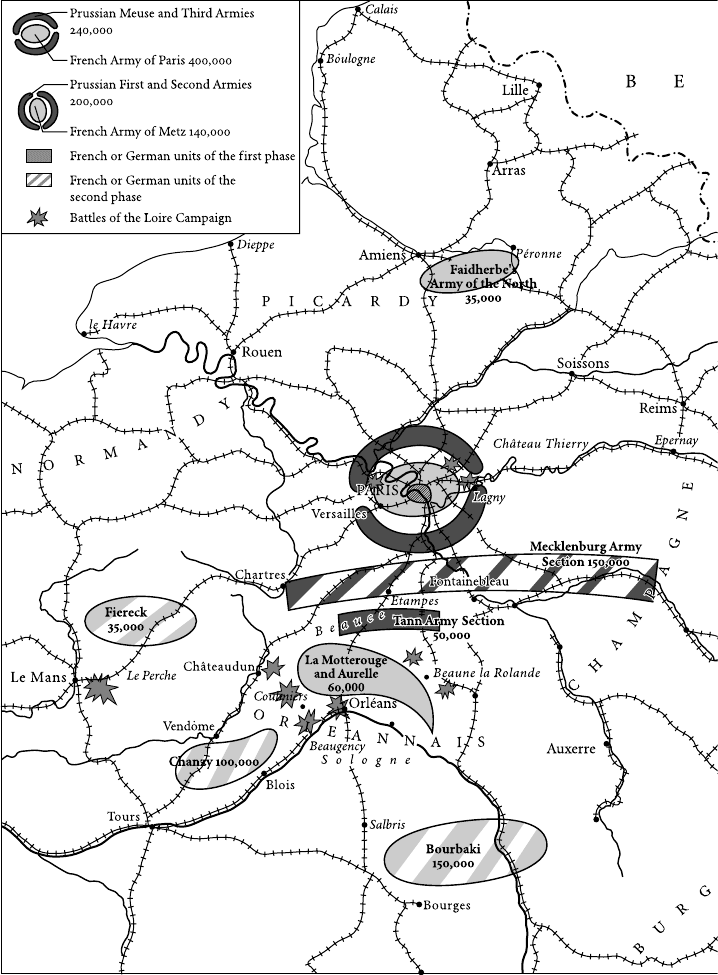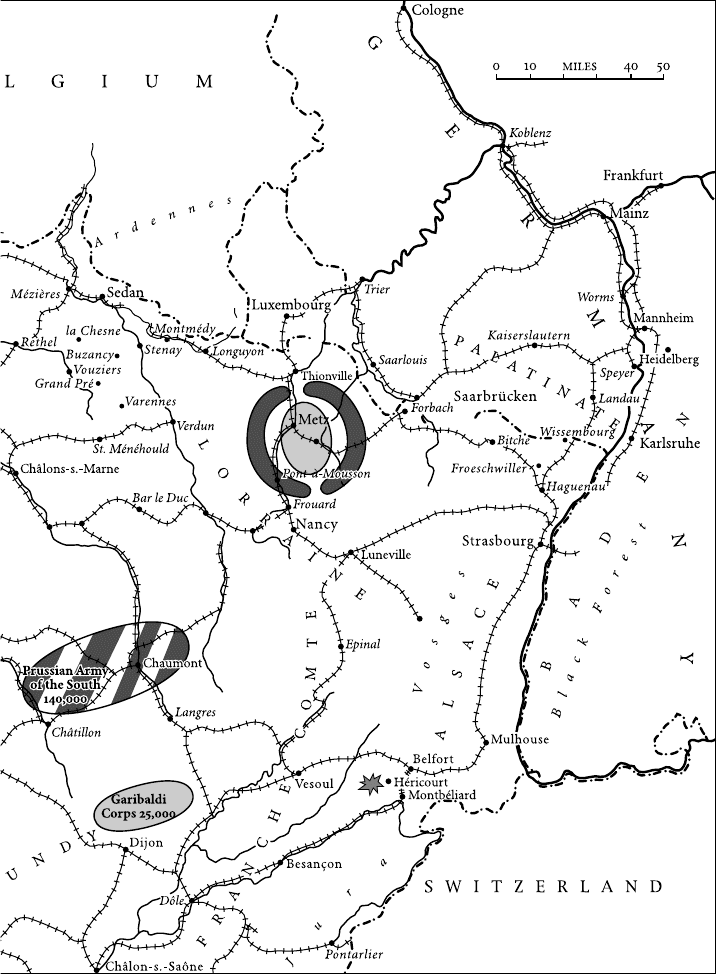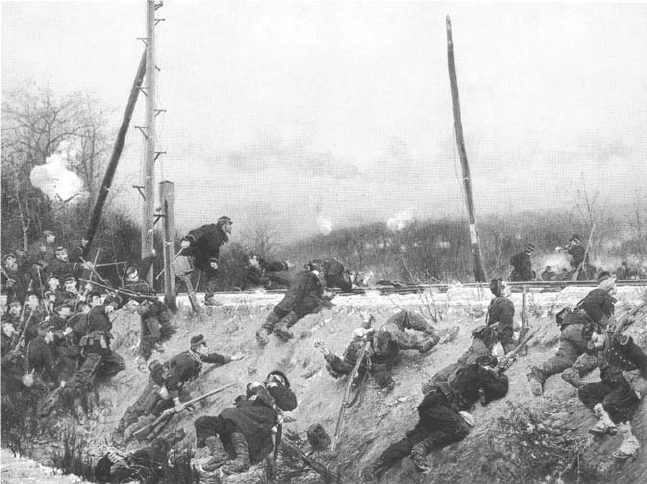Wawro G. The Franco-Prussian War: The German Conquest of France in 1870-1871
Подождите немного. Документ загружается.

P1: IML/FFX P2: IML/FFX QC: IML/FFX T1:IML
CB563-10 CB563-Wawro-v3 May 19, 2003 13:24
253France on the Brink
Richard Berendt, who entered the cavalry camp on the little island formed
by the branching Moselle, found unburied corpses and carcasses and “tents
crammed with sick and wounded.” In the city, the wineshops were filled with
men and officers drinking themselves silly.
83
Despite its inglorious end, observers were struck by the indomitableness
of Metz. Though Bazaine had wasted the asset, the place seemed to prove
the validity of the late nineteenth-century principle of detached forts. For
seventy days, the Prussians had tried and failed to engage Bazaine’s army.
Several times they had pushed field guns far enough forward to bombard
Bazaine’s encamped troops only to be smashed or driven back by well-aimed
fire from the detached forts at St. Quentin, Plappeville, Woippy, St. Julien,
Queleu and St. Privat. Had MacMahon ever arrived with his relief army, the
Prussians would have been most unpleasantly gripped between two fires. Even
without MacMahon, Metz sheltered 140,000 French troops for two months
and pinned down 200,000 Prussians, who did not even attempt proper siege
operations across such a vast space. Every army in Europe would heed the
lesson, and build their own fortress complexes like Metz in the years before
World War I.
To Bismarck’s astonishment, even the fall of Metz failed to shake the
French republic’s determination to hold Alsace-Lorraine. “We are the gov-
ernment of national defense,” Jules Favre, France’s new foreign minister, told
Bismarck. “You know what our program is: “not a clod of our earth or a
stone of our fortresses.” This gamecock spirit – necessitated by the rough
mobs from Belleville and La Vilette that gathered every day in the Place de la
Concorde to demand a hard line with the Germans – drove the pragmatic Bis-
marck to distraction. The cold season and the first cases of flu had appeared
in the German camps. Already in the first week of October, 15 percent of
the Meuse Army was sick, most with complications from their wounds, the
rest with flu, dysentery, and typhoid fever.
84
Doctors watched nervously as
the proportion of sick to wounded men surged, the Bavarian II Corps alone
losing 17,152 men – more than half its strength and six times its losses in bat-
tle – to illness in October.
85
The French forts around Paris were armed and
stocked with provisions. General Bourbaki had finally agreed to organize a
republican army at Lille, and there seemed no obvious path to an armistice, a
feeling underscored by regular, bloody French sorties.
Every few weeks, General Auguste Ducrot would probe the German lines
around Paris, sallying with a modest force, hitting the Germans hard, and then
retiring on the capital. Ducrot was testing the depth of the German trench
lines and planning larger sorties for the day when a relief army appeared from
83 Richard Berendt, Erinnerungen aus meiner Dienstzeit, Leipzig, 1894, pp. 95–8.
84 SKA, P 967, Vert galant, 23 Sept. 1870, Duke Georg to King Johann.
85 BKA, HS 849, Capt. Celsus Girl, vol. 7,p.18.
P1: IML/FFX P2: IML/FFX QC: IML/FFX T1:IML
CB563-10 CB563-Wawro-v3 May 19, 2003 13:24
254 The Franco-Prussian War
the south. On 19 September, straining south toward Tours and the Loire,
Ducrot attacked the Germans at Chatillon and Bagneux. The Germans stood
their ground, but when they counter-attacked, they were ripped by accurate
shellfire from the forts at Issy, Vanves, and Montrouge. The same dismal pat-
tern recurred on 13 October, when seven French battalions struck south again,
drawing the Bavarians into the bowl of fire they had traversed in September.
86
As the Bavarians started forward, the French fortress guns on Mont Val
´
erien
opened up, hammering the Germans through St. Cloud and smashing down
Napoleon I’s pretty little summer palace, the very place where Napoleon III
had declared war in July.
German morale sagged as the battle for Paris settled into trench warfare.
The troops rotated every five days from the rear areas to the front lines where
they worked like convicts, clearing barricades, abatis, and barbed wire, dig-
ging bomb-proof shelters, and winterizing houses abandoned by the French.
One night in October a Bavarian officer awoke to find a house across the
street burning furiously. Pulling on his boots, he ran across to awaken his
troops. When he burst in shouting “the house is on fire,” he found them all
awake but unmoved on their straw pallets. “We know, and we’ve sent some-
one upstairs to watch the fire and warn us when the flames are getting close.”
87
This demoralizing, time-wasting standoff infuriated Bismarck, who consid-
ered the French beaten. “Think about it,” Bismarck shrieked at Favre one day.
“Find a basis for peace, propose something!”
88
Favre had earlier described
Bismarck as “crazed” by German nationalism; Bismarck thought Favre no
less crazed to have committed himself to the inflexible program of “maximum
war.”
To put pressure on the republicans, Bismarck agreed to support national
elections in the fourteen French departments controlled by the Prussians as
well as the seventy-five others. New elections seemed the only way to cre-
ate a French government able to cede territory, pay reparations, and resolve
differences between the radical Government of National Defense in Paris and
the more moderate Government Delegation in Tours. Bismarck and Moltke
proposed to occupy all of France until elections could be held for a truly
national government that, they assumed, would accept Prussia’s terms. Prince
Friedrich Karl warned a British officer in October that the Prussians would
exert unbearable pressure. Paris and Tours would be brought under attack and
200,000 German troops would occupy southern France from Mulhouse across
86 SHAT, Li2, Gouv. De Paris, “Projet d’occupation de la position d’Avron.” BKA, B 1237,
Malabry, 18 Oct. 1870, Gen. Walter, “Relation.” BKA, HS 849, Capt. Celsus Girl, vol. 5,
pp. 69–71.
87 BKA, HS 846, Maj. Gustav Fleschuez.
88 HHSA, PA IX, 96, Paris, 29 Sept. and 12 and 29 Oct. 1870,H
¨
ubner to Metternich.

P1: IML/FFX P2: IML/FFX QC: IML/FFX T1:IML
CB563-10 CB563-Wawro-v3 May 19, 2003 13:24
255France on the Brink
Map 12. The German siege of Paris
to Bordeaux the moment Bazaine surrendered at Metz. This last measure was
in some ways the most menacing, because French peasants and townsmen
would be expected to pay the daily costs of the occupying armies “until a
settled government is returned with which peace can be concluded.” Mean-
while, two entire German corps were readied for an assault on Normandy,
to crush the army rumored to be forming under Bourbaki at Lille and carry
off every pig, cow, and steer in the province to feed the German field armies.
Bismarck also resolved to bombard Paris at the earliest possible date. He had
no humanitarian scruples about shelling a civilian area. What he did worry
about was the winter weather, which would make it difficult to move guns
P1: IML/FFX P2: IML/FFX QC: IML/FFX T1:IML
CB563-10 CB563-Wawro-v3 May 19, 2003 13:24
256 The Franco-Prussian War
and shells from the siege works at Belfort, Strasbourg, Verdun, and Thionville
to the battery positions around Paris.
89
Those parts of France already occupied by the Prussians groaned at the
burden. In October, the French paper Pays estimated the cost of the war to the
French people at 12 billion francs, about $31 billion today. This monstrous
sum included the costs of the mobilization and lost battles as well as property
damage and business losses. Trade slumped, crops rotted on the vine, and
investors suffered from the suspension of dividend payments at most French
companies. In French towns and cities, silver coins vanished. Havre, Dieppe,
Lille, and Evreux issued their own paper currencies. In Lyon, silversmiths
coined plate, and English pounds and pence circulated in Bordeaux.
90
In a
conversation with the British ambassador, Adolphe Thiers lamented the sud-
den removal of the Bonapartes and the creation of a republic, “which only
irritates and alarms a great part of the population of the French provinces.”
91
Outside Paris, there was deep hostility to the republic and the “balloon gov-
ernment” at Tours, which the peasants and provincial bourgeois increasingly
identified with taxes, war-mongering, and “red revolution.” Republican ef-
forts to swing opinion behind the new government merely exacerbated the
problem. Popular mayors once loyal to Napoleon III were dismissed and re-
placed with men more “republican” in spirit, who practiced a most unpleasant
“absolutism in the provinces” throughout the fall and winter of 1870–71.
92
Into this troubled landscape rode General Ludwig von der Tann in early
October 1870. With Paris and its garrison strangely quiet (“Trochu, a soldier
who dips his sword in ink and his pen in the scabbard,” Parisians joked),
Moltke felt confident enough to detach Tann with his Bavarian I Corps, a
Prussian infantry division and two cavalry divisions to “scour the countryside
down to the Loire.” Having failed to compel a French surrender with the
victories at Sedan and Metz, Moltke now sought to destroy the “relief armies”
and insurgents forming around Orl
´
eans. A few more Prussian victories would
persuade Tours and Paris of the futility of further struggle. The plan made
perfect sense to Moltke. To his cold, footsore troops, it seemed just another
step into a deepening quagmire.
93
89 PRO, FO 64, near Metz, 10 Oct. 1870, Capt. Henry Hozier to Granville.
90 PRO, FO 64, Berlin, 25 Oct. 1870, Loftus to Granville.
91 PRO, FO 425, Paris, 8 Sept. 1870, Lyons to Granville.
92 PRO, FO 425, Tours, Nov. 1870, “Report by Mr. West on the state of France.”
93 SKA, ZS 158, Lt. Hin
¨
uber, “Tagebuch,” 12 Oct. 1870.

P1: IML/FFX P2: IML/FFX QC: IML/FFX T1:IML
CB563-11 CB563-Wawro-v3 May 19, 2003 13:51
11
France Falls
The immediate objective of General Tann’s new “Army Section” – a Bavarian
corps, a Prussian infantry division and two Prussian cavalry divisions – was to
find and destroy the French XV Corps under General Joseph La Motterouge.
Ordered by War Minister Lefl
ˆ
oto“dosomething for the sake of public opin-
ion,” La Motterouge had drawn in his brigades from Vierzon, Bourges, and
Nevers and concentrated them at Orl
´
eans. Sent south by Moltke to preempt
threats like this and “clear the country between Paris and the Loire,” Tann
left Etampes with five divisions in early October.
Marching and eating well in the flat, gold-stubbled Beauce, the Germans
made good time. Each cross road that ought to have been held by the French
was either deserted or lightly defended, allowing the Germans to punch
through easily using their cavalry and guns to maximum advantage on plains
so flat and featureless that, as one veteran put it, “the earth and sky swam to-
gether before your eyes.” With most of France’s regular army in captivity, the
Germans collided with a strange soldatesca, including francs-tireurs (irregular
“sharpshooters”) and new formations of “partisans.” Because the Germans
were summarily executing francs-tireurs – depressing morale among would-
be guerrillas – the government at Tours had created semi-official partisan
companies that carried government pay books and wore uniforms, albeit out-
landish ones. The Partisans de Gers, encountered by the Prussians at Etampes,
wore long black coats, black trousers, red scarves, and broad-brimmed
Calabrian hats. Most were either boys or men in their forties, which sug-
gested to the Prussians that drafts for the regular army, reserves, and gardes
mobiles had eaten up most of France’s prime manpower.
If, as Victor Hugo claimed in September 1870, there were 10 million
young Frenchmen “burning to join the fight,” they were burning slowly.
Their neighbors were not burning at all: Partisan prisoners complained that
257

P1: IML/FFX P2: IML/FFX QC: IML/FFX T1:IML
CB563-11 CB563-Wawro-v3 May 19, 2003 13:51
258 The Franco-Prussian War
Map 13. The war after Sedan, Sept. 1870–Feb. 1871

P1: IML/FFX P2: IML/FFX QC: IML/FFX T1:IML
CB563-11 CB563-Wawro-v3 May 19, 2003 13:51
259France Falls
P1: IML/FFX P2: IML/FFX QC: IML/FFX T1:IML
CB563-11 CB563-Wawro-v3 May 19, 2003 13:51
260 The Franco-Prussian War
no French peasant would help them, guide them or fill their requisitions.
They were shunned or shooed off everywhere they went lest they attract
German reprisals.
1
For many military-aged Frenchmen, Bazaine’s capitula-
tion at Metz had banished all thought of fighting on: “If the troops at Metz
dared not sally against the Prussians, how on earth would a new, badly
armed, badly led army of green conscripts oppose a Prussian army that a
Marshal of France with 160,000 men had considered invincible?”
2
Against
fractured, demoralized opposition like this, the Germans rolled unmolested
through Angerville and Pithiviers on 9 October before finally meeting real
resistance just north of Orl
´
eans on a line between Artenay and Bucy-le-roi.
the battle of orl
´
eans, 10–11 october 1870
Anchored by his regulars, Turcos and chasseurs, La Motterouge held for an
hour before his corps began to melt away, led by the undisciplined mobiles.
Terrified by the thunder of the German guns and rifles which pinned their
front while the German cavalry circumvented their flanks, the French ran
into the Forest of Orl
´
eans, or straight south toward the city and its bridges.
Along the way they met with carriages of elegantly dressed Orl
´
eanais, who
had ridden out to watch the battle only to be swallowed up in the rout.
3
As night fell on 10 October, both sides rested, the Germans feasting and
swilling in cottages that had been so hastily abandoned that they were still
stocked with food and wine. After witnessing the panic-stricken rout of the
French XV Corps, Tann assumed that La Motterouge would use the night
to evacuate Orl
´
eans and escape to the south bank of the Loire. This was an
acceptable outcome to Tann, who would then trumpet the capture of Orl
´
eans
for propaganda purposes and use the city and its bridges to attack Tours from
both banks of the Loire. For his part, La Motterouge felt constrained to cling
to Orl
´
eans. To lose it would end his military career and force Gambetta’s
government delegation to flee further south.
While Tann distributed orders for the morning advance on 11 October,
La Motterouge deployed the remains of his corps in defensive positions north
of the city, from Saran south to the outskirts of Orl
´
eans, where the Orl
´
eans-Le
Mans railway embankment offered excellent cover and fields of fire. In good
hands, La Motterouge’s position would have held indefinitely, for it was a
natural fortress: stone houses and high-walled roads wending through vine-
yards and apple orchards. But France’s reserve army contained a large number
of bad hands: dispirited, reluctant reservists and gardes mobiles, who had no
1 London, Public Record Office (PRO), FO 64, 693, Berlin, 21 and 26 Oct. 1870, Capt. Hozier.
2 Vincennes, Archives Centrales de la Marine (ACM), BB4 906, Cherbourg, 16 Sept. 1870,
Prefecture Maritime to Naval Delegate at Tours. Col. Andlau, Metz, Paris, 1872,p.222.
3 F. Maurice, The Franco-German War 1870–71, London, 1914, pp. 381–3.

P1: IML/FFX P2: IML/FFX QC: IML/FFX T1:IML
CB563-11 CB563-Wawro-v3 May 19, 2003 13:51
261France Falls
Fig. 15. The French defense of Orl
´
eans
intention of fighting to the death. Reviewing his troops before the battle, one
of La Motterouge’s colonels nearly choked with embarrassment: “They were
shabbily dressed – dirty clothes and broken shoes – clutching cloth sacks
without straps, and badly armed: old percussion rifles and tiny pouches that
barely held a single packet of cartridges.” Many of these new battalions had
already lost 20–30 percent of their strength to “illness,” which usually meant
overweight, hastily conscribed civilians unable to march or work with their
hands. Most of the mobiles were holding rifles for the first time, a dangerous
development that explained their alarming “friendly fire” losses and somewhat
mitigated the French loss of all but twenty-six mitrailleuses in the fighting at
Sedan and Metz.
4
On 11 October, Tann attacked the French positions before Orl
´
eans in
three columns, which pushed in on the Chartres and Paris roads. Resistance
was stoutest on the French right, where La Motterouge had deployed his
regulars: the 39th Regiment and elements of the French Foreign Legion just
4 SHAT, Le19, Auch, 18 Aug. 1871, Col. P. Taberne, “Rapport historique.” Ld 20, Lausanne,
22 Feb. 1871, Eduard Tallichet to Min. of War. Ld 4, Chanu, 15 Nov. 1870, 39 Regt.,
3eme Bataillon, Garde Nationale Mobile, “Rapport.” Ld 1, Tours, 26 Nov. 1870, Directeur
d’Artillerie. Le 19, Auch, 18 Aug. 1871, “85e Regt. de Mobiles (Gers, Vienne): Rapport
Historique.”
P1: IML/FFX P2: IML/FFX QC: IML/FFX T1:IML
CB563-11 CB563-Wawro-v3 May 19, 2003 13:51
262 The Franco-Prussian War
arrived from Oran. Using the ground cleverly and fortifying Les Aides and
the Faubourg Bannier, the French pinned down the Bavarian I Corps until
two o’clock, when the Prussian 22nd Division smashed through La Borde on
the French left, knocking La Motterouge’s entire front backward. In truth, the
French were already reeling. Withdrawing from Cercottes on the edge of the
forest, Captain Edmond Duchesne of the 29th Regiment collided with leader-
less bands of mobiles from the nearby Cher and Ni
`
evre, who “had no cavalry,
no artillery, and no sense of direction at all.” Demoralized and hungry –
they had not been fed for two days – the whole tangled ruck of French troops
collapsed under the Prussian artillery, which fired from beyond the range of
the French guns, sowing terror among the Duchesne’s green infantry and their
supports.
Whereas the Prussian guns fired nonstop, the poorly supplied French
artillery ran through their shells in an hour.
5
A Bavarian who pushed through
Les Aides and Bannier called both places “a second Bazeilles,” a reference to
the Meuse crossing at Sedan that had been reduced to smoking ruins by the
end of the battle. In the Forest of Orl
´
eans, the Germans took prisoners in
unfamiliar gray uniforms; they were French papal zouaves summoned in July
but only just arrived from Rome.
6
Those lucky enough to escape the German
pincers ran south or into the woods to the east, pursued by the sounds of
German celebration behind them: thumping bands, lusty cheers, and joyful
hymns. Many more were overrun, in most cases those troops La Motterouge
could least afford to lose, namely 900 of 1,300 French Foreign Legionnaires
and 3,000 other regulars.
By late afternoon, the advancing German troops, who suffered just 900
dead and wounded in the advance, streamed into Orl
´
eans itself. This amaz-
ingly literate army, most of whom had read or heard about Schiller’s “Maid of
Orl
´
eans,” crowded into the central square to gaze wonderingly at the statue of
Jeanne d’Arc (“Sauve la France!”) and marvel at their easy victory. Gambetta’s
newest army had been thrashed and France conquered all the way down to
the Loire. La Motterouge had retreated south to Gien, where he nervously
straddled the Middle Loire and awaited a German pursuit.
7
Freshly arrived in
Tours from Italy in the second week of October, Europe’s greatest republican,
Giuseppe Garibaldi, must have wondered why he had come. The French re-
public was proving feckless both politically and militarily: Gambetta’s army
was stumbling from one bloody defeat to another and his government, in
quite un-republican fashion, had again “postponed” already overdue national
elections lest voters return conservative peace candidates to power.
5 SHAT, Ld 1, Argent, 20 Oct. 1870, Capt. Duchesne, “Rapport.”
6 Munich, Bayerisches Kriegsarchiv (BKA), HS 856, Lt. Josef Krumper.
7 SHAT, Le 19, Paris, 25 June 1871, Col. d’Arguelle, “R
´
esum
´
e des Op
´
erations de Guerre.”
